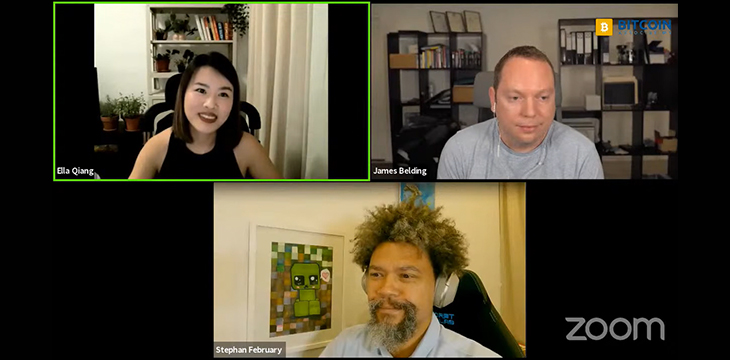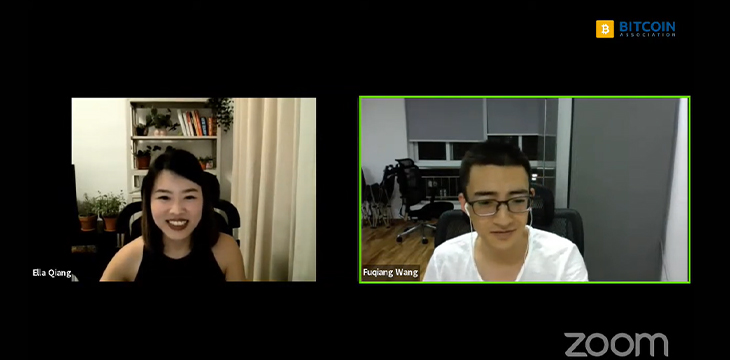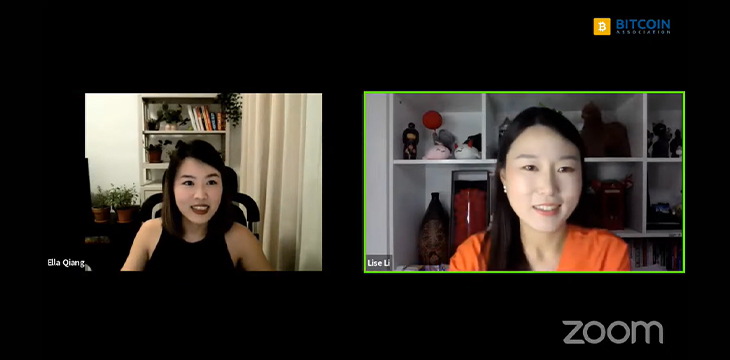|
Getting your Trinity Audio player ready...
|
Tokens, how they’re useful and what the surrounding issues are: that was the main theme of Bitcoin Association’s latest Bitcoin SV Virtual Meetup. Guests Stephan February (Twostack) and James Belding (Tokenized) talked tokenized securities, while Fuqiang Wang demonstrated the new TokenSwap AMM DEX platform, the first to run on the BSV blockchain.
Blockchain Association China Manager Lise Li also joined host Ella Qiang for an update on the association’s activities in China. Bitcoin Association has been building relationships in the academic world, joining in lectures and connecting with professors in different majors and disciplines who have shown an interest in blockchain technology.
Bitcoin Association will also host an in-person DevCon in Shanghai in early September, giving BSV companies from across China a rare (these days) opportunity to meet and discuss in the physical world. Similar to its academic projects, the association will also invite companies from outside the BSV ecosystem, such as those in Big Data and environmental industries, to discuss BSV-related issues.
Qiang also asked for some clarification on China’s central bank digital currency (CBDC), which has the ticker symbol ECNY. It’s basically a 1:1 digital equivalent to the Chinese yuan circulating as cash, and not a blockchain network, yet it has some similarities like traceability and enabling extra data to be added to transactions.
Tokenized securities
Tokens and what they represent was the main discussion point of the meetup. Both Belding and February agreed that the technical capabilities to tokenize securities and other financial products were already in place, but that education and regulatory approval represented the biggest hurdles.
“Too much has been made of definitions in this space,” Belding said, adding that no major changes to law are necessary to use Bitcoin technology to tokenize and manage assets. Blockchain’s largest value proposition is to automate and standardize procedures, providing the “universal source of truth” that doesn’t currently exist. Investors these days must wade through mountains of separate, complicated documents in often-incompatible formats and from different sources, which costs unnecessary time and money. This also means there’s a lot of doubling-up on some tasks, which adds doubt, cognitive load, and further expense.
One contract-based protocol that handles legal/accounting and administrative processes, due diligence checks and disclosure requirements; keeps a record of everyone’s rights/duties and authorizations, and timestamps it all on one trusted ledger would add massive value. “Huge economies of scale come from that,” Belding said. Digitizing and tokenizing the assets themselves is only 5% of the work, and “smart contracts” is where the rest of the value lies.

February referred to Singapore, where smaller and retail investors are often excluded from capital markets due to “accredited investor” requirements with a high entry bar. These markets (which include bond issuance) could be made less risky and more useful to “mom and pop” operations that perhaps needed to raise money for smaller-scale projects.
Belding said he wasn’t sure if that would happen anytime soon, but that using blockchain contracts would certainly mitigate the risks that are the main reason for excluding less-sophisticated investors. Once the correct processes are in place, in a way that satisfies and gains the trust of regulators and all other participants, people could develop ways to simplify capital market investments and make records easier to keep track of—perhaps even someday on a mobile app that anyone could use.
TwoStack is a technical resource for BSV blockchain developers with guides and software libraries in Dart and Java. Tokenized is a token/contract platform aimed at bringing together and automating processes in the business and finance worlds.
Token swapping
Fuqiang Wang also joined the meetup to demonstrate TokenSwap, which went live recently. Qiang described it as the “first AMM-style DEX on BSV,” and it also uses blockchain contracts to swap digital assets while allowing anyone to participate as a market-maker by adding liquidity to the pool.
Similar systems currently exist on Ethereum and BinanceChain, and though popular they are often plagued by problems with trust, and high transaction costs in peak trading times. Though TokenSwap is still in its infancy, it solves a lot of problems by being scalable and fast, with no concerns about transaction fees suddenly skyrocketing. BSV’s more straightforward transaction-ordering rules also offered an advantage over Ethereum, he added.

Wang, who said he’d been surprised at how quickly the TokenSwap concept went from idea to working product, performed a live swap between BSV and MetaCoin to show its speed and ease of use. From here, he said, it was a matter of bringing more liquidity to the platform, enabling a lending protocol and hopefully adding stablecoins, would help it grow.
At this stage, many of the technical challenges to tokenizing and handling assets on the BSV blockchain are taken care of—or at least, developers have a good idea how to implement them. The main challenge, as the guest speakers highlighted, is getting information out there, and convincing regulators and the potential user base that BSV is the most secure platform on which to build these systems.

 02-13-2026
02-13-2026 




